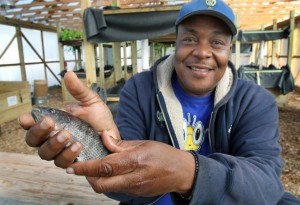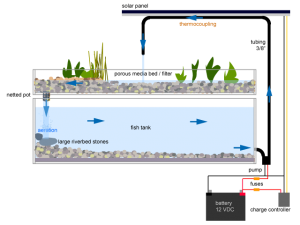Urban agriculture is sure gaining momentum!
I recently read about the Rid-All Green Partnership, an urban farm smack in the middle of Cleveland, Ohio dedicated to promoting sustainability and healthy eating as well as creating jobs for the community. The land they’re on used to be an illegal dump in the Forgotten Triangle, an area in Cleveland’s Kinsman neighborhood which is apparently so devoid of people it might as well be Wyoming, but through hard work and a great deal of enthusiasm they were able to turn that land into the bustling farm it is today. These guys are really at the forefront of urban agriculture and have been able to do some outstanding things for their city!
Rid-All was started in 2010 by three childhood friends–Randell McShepard, Keymah Durden, and Damien Forshe–who grew up together in the Lee Miles neighborhood of Cleveland. McShepard is a corporate executive and co-founder of a public policy think tank; Durden is a mechanical engineer who had a chain of vegetarian soul food restaurants; and Damien Forshe is an independent businessman with an environmentally-friendly exterminating service, from which Rid-All borrowed their name. The three are all very passionate about urban agriculture and extremely devoted to their main goal, which is to transform Cleveland into an environmentally sustainable city. Another goal of theirs, one they find equally as important as the one for sustainability, is to help create jobs. Many of Cleveland’s low-skilled workers have suffered in the recent economic downturn, so Rid-All offers training classes and employment at their farm. I think it’s fantastic that they put the same amount of effort into this goal as they do sustainability, as farming is the sort of trade where there’ll always be jobs and that really helps to provide better opportunities for people who wouldn’t get them otherwise. Rid-All joined up with urban farming association Growing Power to become one of their 15 urban training centers, giving workers a chance to learn new skills.
Right now, Rid-All has four greenhouses at around 7000 square feet each, with each growing crops like corn, tomatoes, lettuce, zucchini, peppers, celery, collared greens, kale, broccoli, spinach, and herbs like sweet basil, thyme, and oregano. They’re able to get out 150-200 pounds of vegetables each week, distributing them among the community, and are also raising thousands of tilapia! They have quite a novel system going on to grow their plants and raise their fish, using hydroponics, aquaponics, and nutrient-rich soil courtesy of their enormous compost pile.

Photo Credit: Chuck Crow, The Plain Dealer
For those of you who don’t know what aquaponics is (e.g. me before I started writing this), it’s the combination of aquaculture and hydroponics. Aquaculture is fish farming and hydroponics is growing of plants with water, not soil. As a hybrid of the two, aquaponics works by filtering out the fish’s waste and using it as fertilizer for plants which, by using said waste, clean up the water for the fish. Essentially, the plants keep the tilapia from getting poisoned by their own waste. Here’s a diagram for all the visual learners out there:

Photo Credit: http://aquaponicssystemseasy.com/
Pretty clever, huh? What a great way to conserve water, take up less space, and keep everything organic!
As for composting, Rid-All gathers a whopping 4000 pounds of food waste each week from local stores and restaurant–that’s a pretty awesome way to take advantage of the seriously ridiculous amount of waste these places are known for. Since that’s an huge amount of food to turn into soil, they also use worms to speed up the process. They distribute a portion of their soil around to the community for those at risk for soil contamination from heavy metals, like lead. This is extremely common in big cities like Cleveland, and one of the easiest, cheapest solutions is to lay compost in raised beds so that plants can be still be grown on the land.
Rid-All also focuses on community outreach, teaching Clevelanders the importance of their mission of sustainability. One way they do this is by writing and publishing a comic book, “Brink City–Green in the Ghetto”. Brink City is a superhero comic where the characters fight environmental injustices and it gets handed out to local students. It’s been a big hit, even spawning a play inspired by the it, performances of which were held at Cleveland’s amazing Karamu House in January.
Looking into the future, Burten, Bell, Carr Development, Inc., a nonprofit development company, is helping to secure Rid-All the acre of land right across the street. Rid-All intends to build another greenhouse on it, one big enough for training classrooms and a kitchen, and they’re aiming to get started on that sometime this year. Rid-All is hoping to gain enough support that they’ll be able to generate income for the farm year-round in order to get food out to those who need it. Judging by the amount of support they’ve managed to generate so far, from organizations like the Sisters of Charity Foundation of Cleveland, JP Morgan Chase Foundation, Neighborhood Leadership Institute, the Walmart Foundation, Inner Visions of Cleveland, Farmer Jones Indoor Market, and the Cleveland Food Bank, their community truly believes in Rid-All’s mission to transform Cleveland and is more than eager to help. They should definitely be able to reach their goal!
For more information, check out these links:
Sources
Videos
